
If you have been looking for the perfect Veg Noodles recipe that can be made at home, with ease and the same essence of Indo-Chinese cuisine, then here’s one for you. This is ultimate Vegetable Noodles recipe, which is stir-fried noodles made with all your favorite fresh vegetables, ginger, garlic, celery and flavored with soy sauce. This dish is just apt for a quick weeknight meal. Ready in just 30 minutes, this recipe is vegan, kid-friendly and is fully customizable.
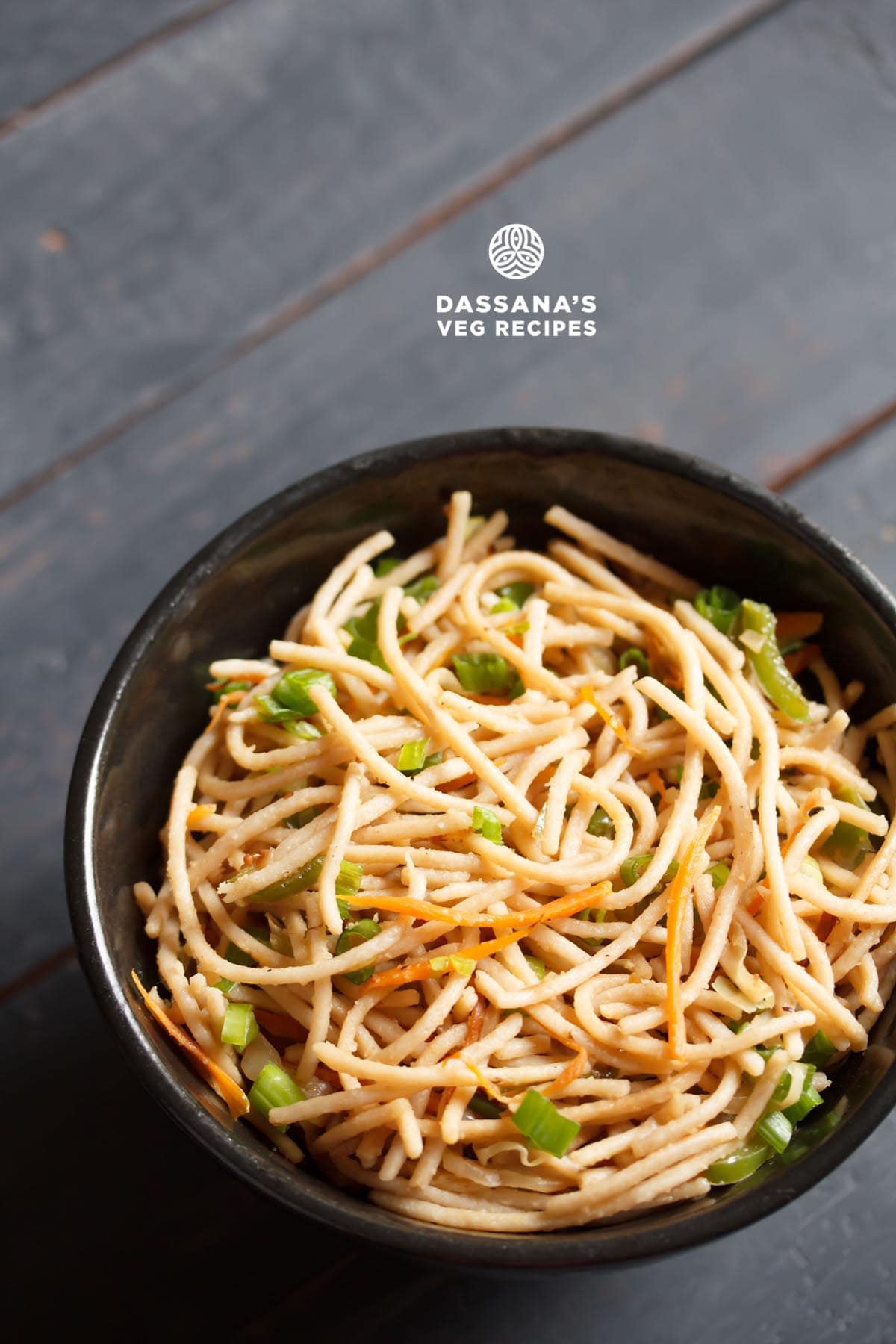

About Veg Noodles
Got your favorite variety of noodles at home and some fresh veggies? I’d suggest you toss them up together along with some other classic ingredients and sauces of Chinese/Indo-Chinese cooking and make a hearty bowl of this Noodles recipe.
This Veg Noodles recipe is easily doable with either the plain flour variety of noodles or even whole wheat ones.
All you have to do is to cook the noodles to an al dente nature first. And then, stir-fry them with your aromatics, vegetables and the typical Indo-Chinese sauces and seasonings.
In addition to the noodles, veggies and aromatics, other ingredients that are used in this Vegetable Noodles recipe are soy sauce, crushed black pepper and vinegar. You can use rice vinegar, white vinegar or even mirin in this dish.
To make these noodles with vegetables, you could choose any neutral tasting oil. If you like sesame oil, you could use it too. I prefer to make mine with sesame oil, olive oil and avocado oil.
This easy stir-fried noodle preparation has just the right level of spice. Not too much heat, not very pungent, but still filled with so much flavor.
Thus, perfect for kids as well as a much-loved family meal too. Since all the ingredients are also plant-based, this preparation is also vegan friendly.
The vegetables that I like to add in this Vegetable Noodles are cabbage, carrots, French beans, capsicum (bell peppers) and spring onions.
You can even add more or less veggies according to your preferences, and a variety of fresh mushrooms too, to bring in a nice umami flavor.
If you don’t have celery, then you can use chopped coriander leaves instead. All these really make this dish quite nutritious as well. If you love spicy noodles, you can perk this Noodles recipe up with some chili sauce or chili oil, too.
Step-by-Step Guide
How to make Veg Noodles
Prep Veggies
1. First, rinse and shred or chop all the vegetables and keep aside. You will need 1 cup shredded cabbage, ½ shredded carrots, 8 to 10 thinly sliced or finely chopped French beans, ⅓ sliced capsicum and ⅓ cup chopped spring onion whites.
Increase the quantity of vegetables according to your preferences. Add some cremini or button mushrooms, if you like.
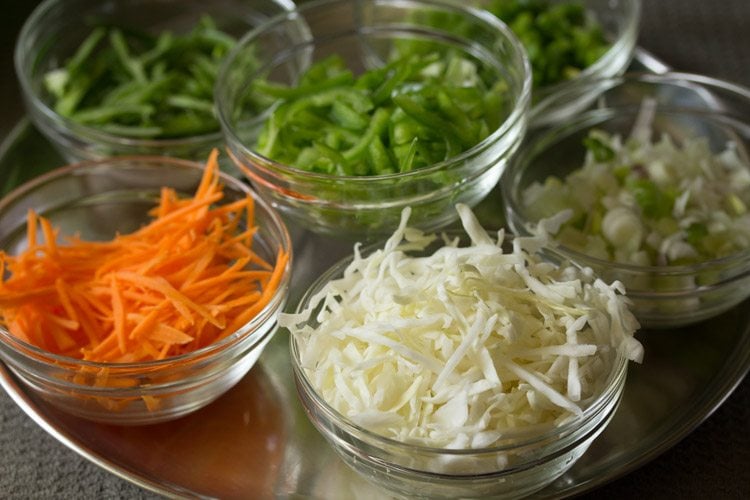

Cook Noodles
2. Next, heat 5 to 6 cups water in a pan.


3. When the water comes to a boil, add ½ teaspoon salt.
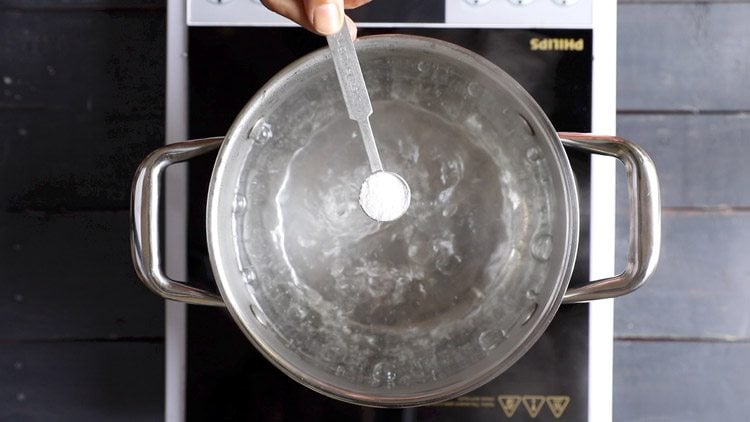

4. Next, add ½ teaspoon oil and mix well.
Add any neutral oil.


5. Then, add about 200 grams noodles.
I have used whole wheat noodles. The recipe is customizable with any noodles – instant, ramen, soba, chow mein, udon, rice, etc.
Cook the noodles according to the package instructions as every variety of noodle will have a different cooking time.
For any variety of noodle, you need to cook them until al dente.
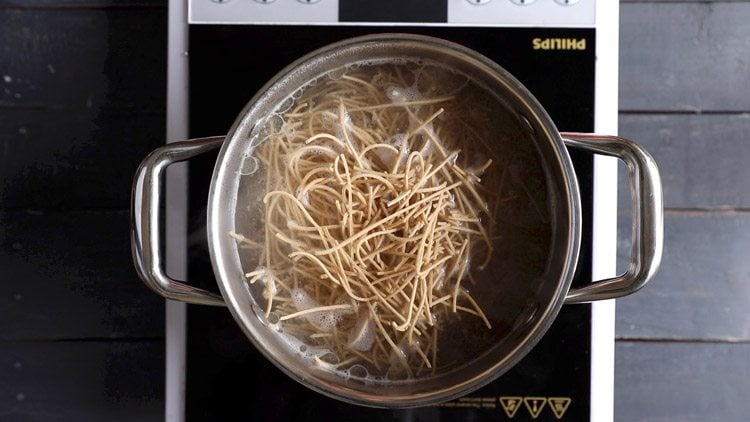

6. Now, boil until the noodles are cooked al dente.
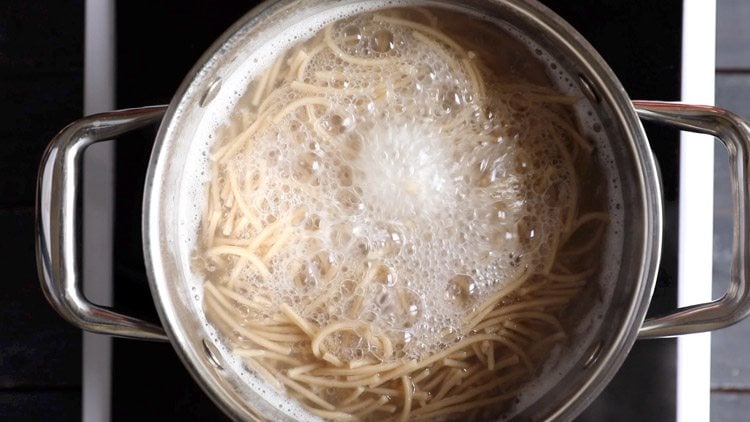

7. Check the doneness throughout the recipe by pressing a few noodles or tasting them. They should be softened, but still have a slight bite to them.


8. Then, drain the cooked noodles in a colander or sieve.
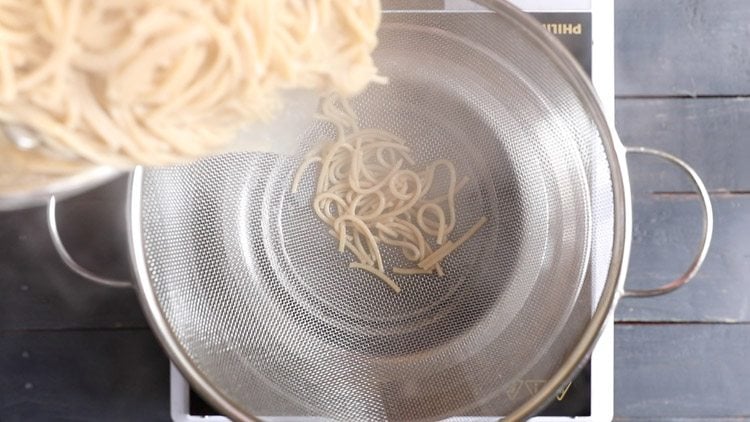

9. Next, rinse the noodles with fresh water.
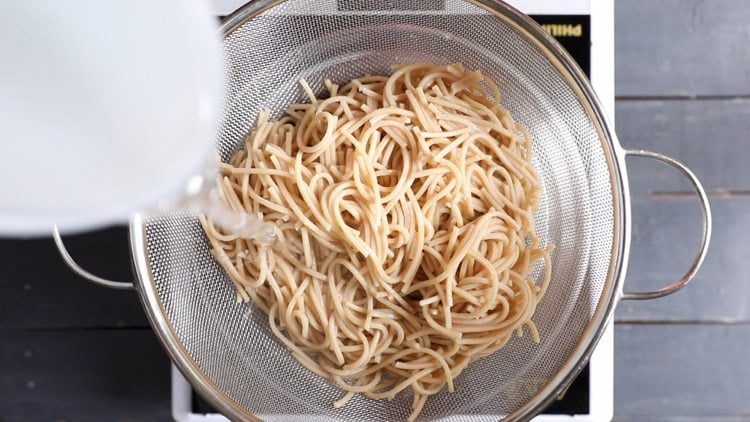

10. After that, keep aside. You can even toss the noodles with 2 to 3 teaspoons oil, if desired.
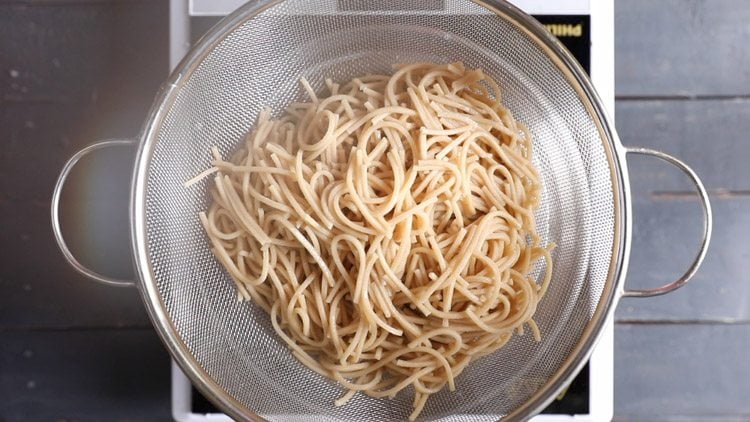

Stir Fry Vegetables
11. Heat 2 to 3 tablespoons toasted sesame oil in a wok or pan. Keep the heat to low or medium-low. Add 1 teaspoon finely chopped garlic and 1 teaspoon finely chopped ginger.
Swap toasted sesame oil with any neutral oil or olive oil.
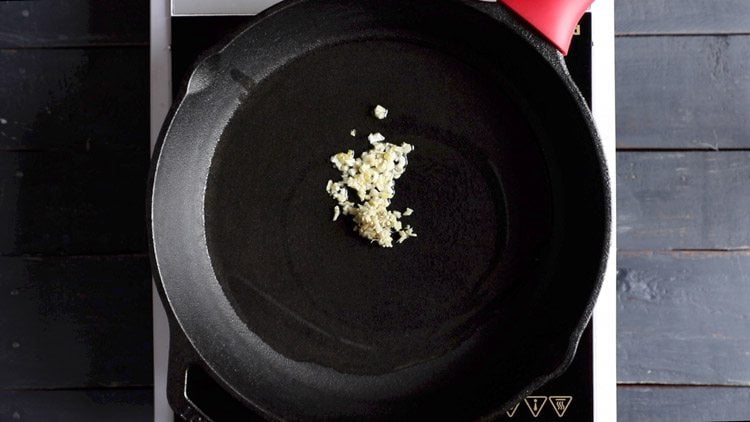

12. Next, stir-fry or sauté for some seconds.
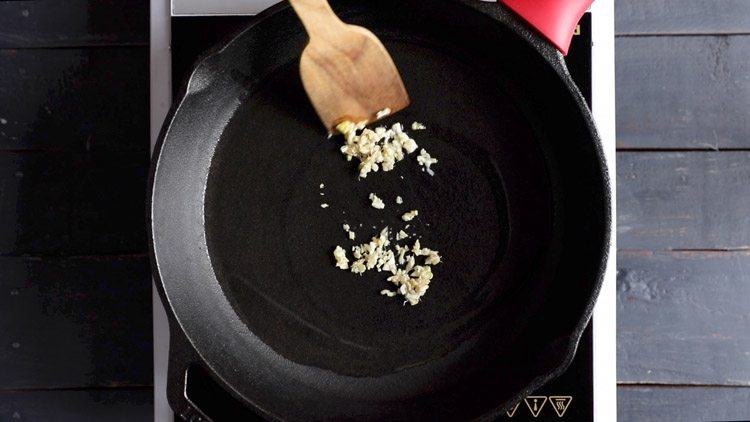

13. Then, increase the flame to high and add ⅓ cup chopped spring onions (scallions).
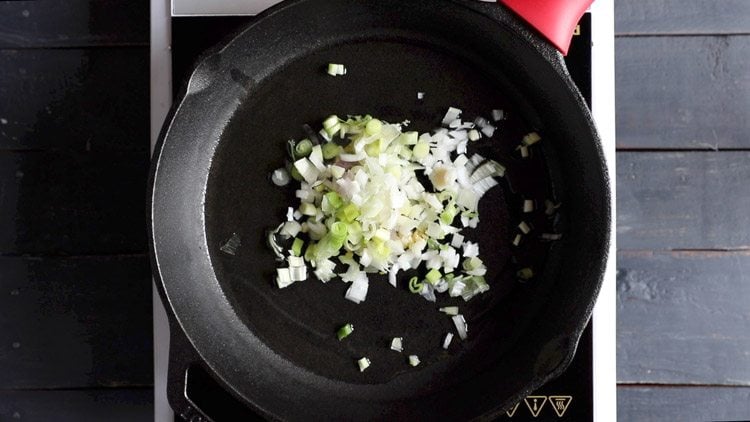

14. After that, keep stirring continuously and stir fry the onions until translucent.
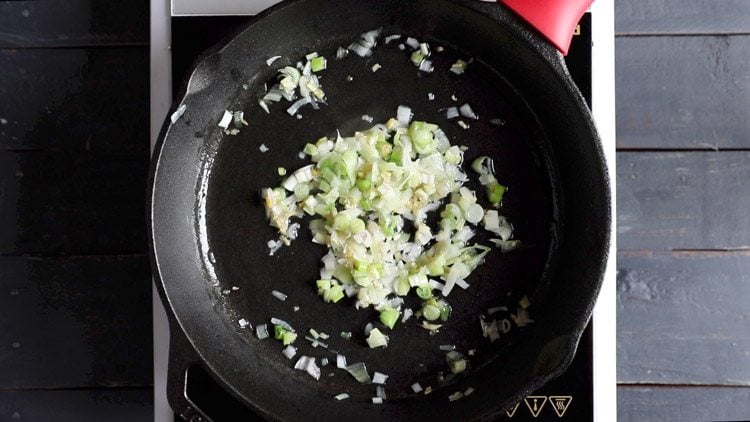

15. Then, add thinly sliced French beans.
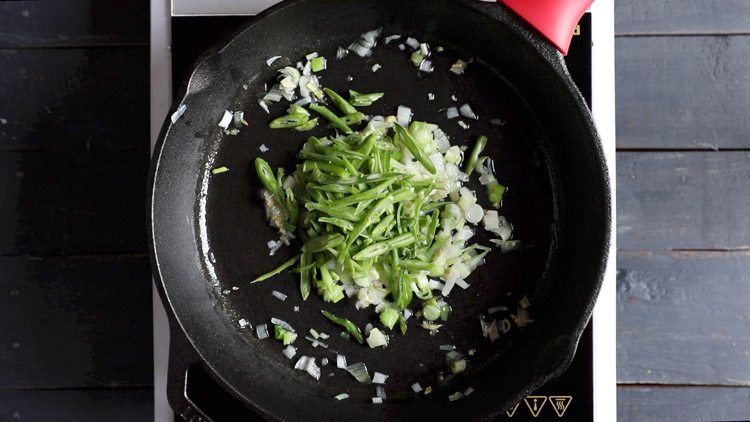

16. Continue to stir fry on medium to high heat for 2 to 3 minutes.
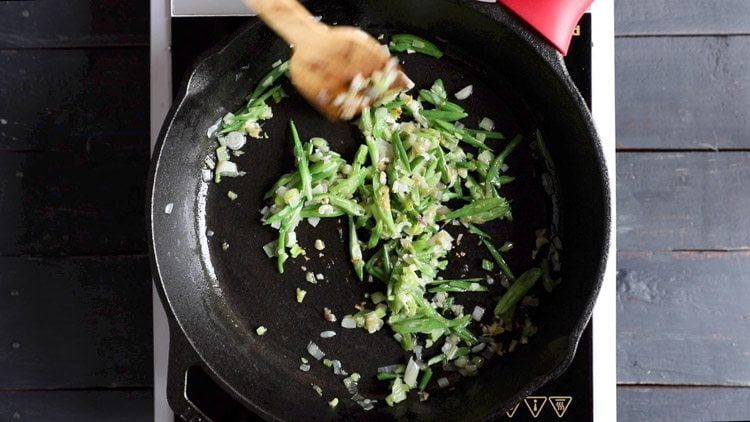

17. Then, add the other vegetables: shredded carrots, thinly sliced capsicum and shredded cabbage.
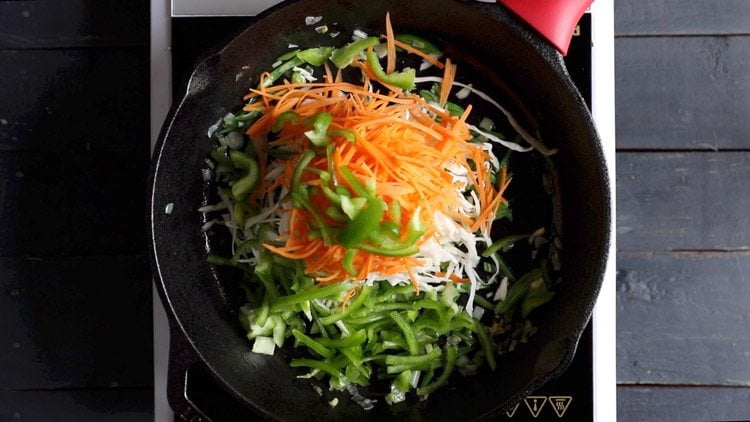

18. Continue to toss and stir fry on medium to high heat until the vegetables are almost cooked. If possible, it is best to use a pan with handles as it is better to lift it while tossing.
You can also decrease the flame if the heat becomes too much to handle and then stir fry the vegetables on medium heat.
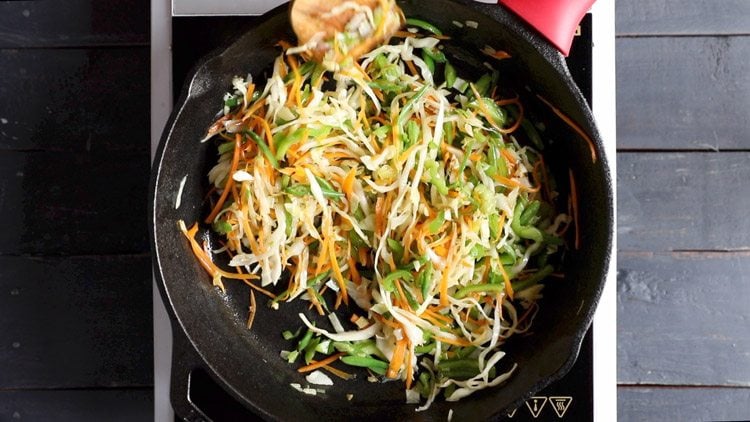

19. Some crunch should be there in the vegetables. So, don’t cook the vegetables till completely soft.
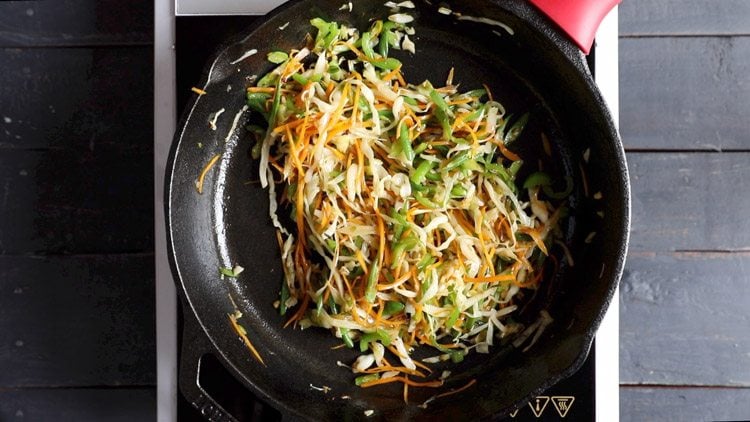

20. Then, add 1 to 2 teaspoons finely chopped celery.
You can skip celery, if you do not have it.
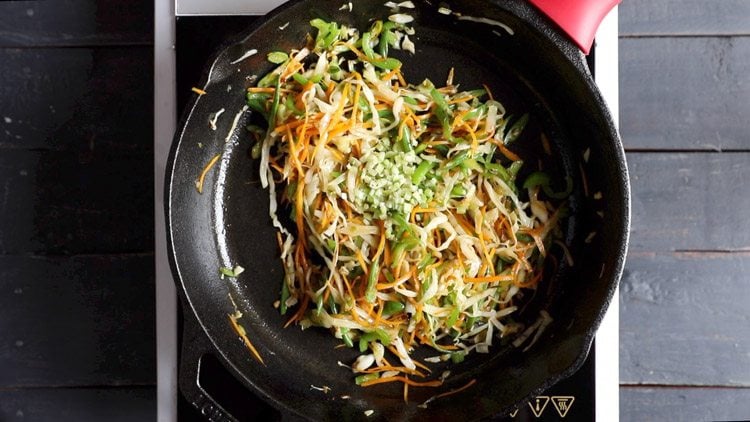

21. Next, add 1 to 2 tablespoons soy sauce and mix well.
Note: Try to use naturally brewed soy sauce.
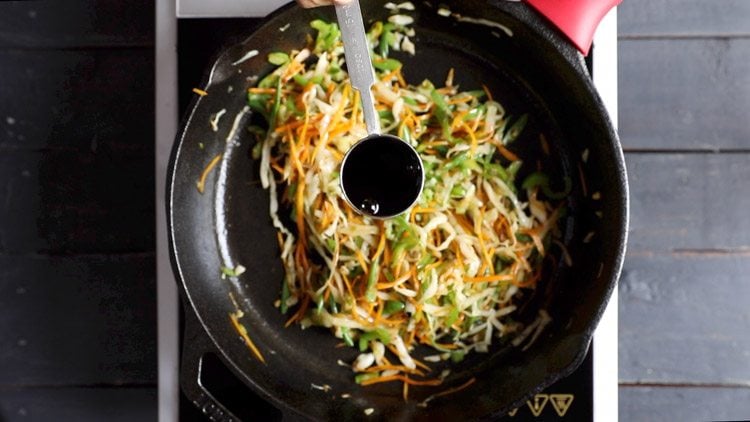

22. Then, add salt and crushed pepper as required.
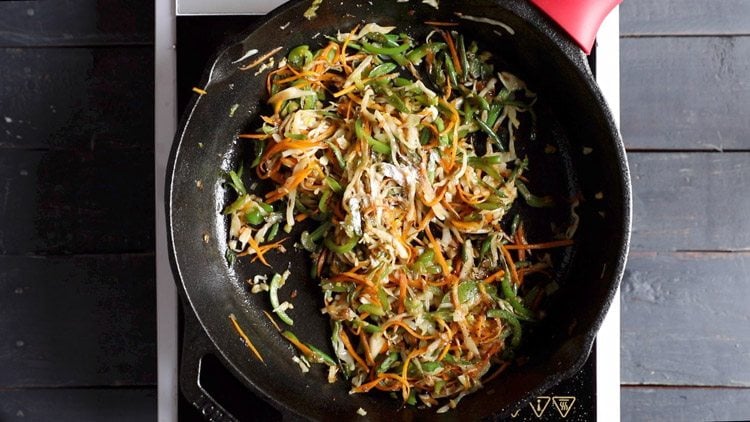

23. Stir and mix very well.
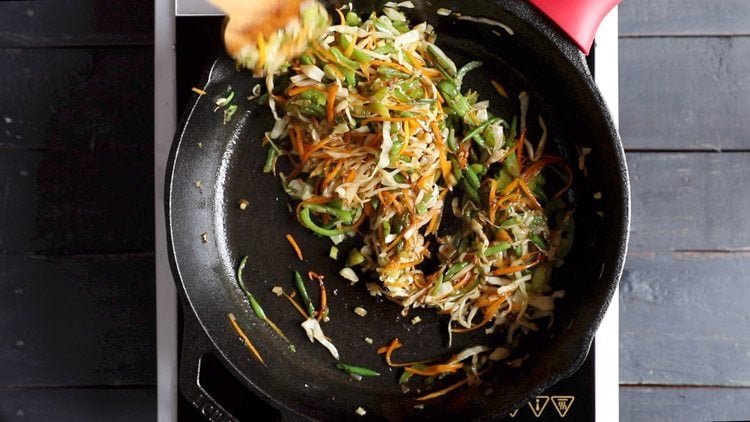

Make Veg Noodles
24. Now, add the cooked noodles.
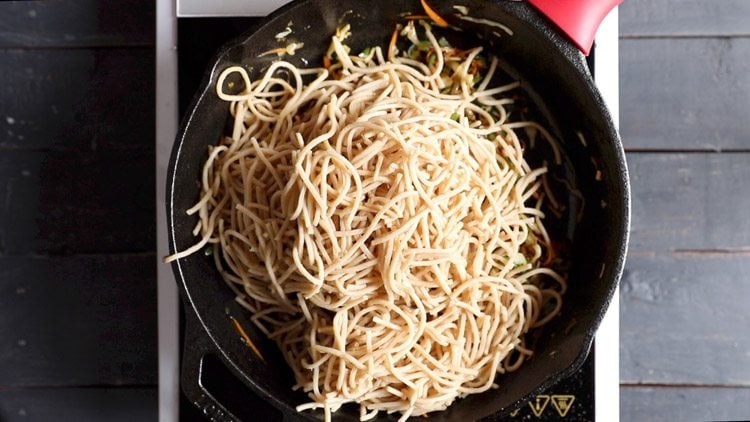

25. Keep tossing and stirring for a minute or two or till the vegetables are mixed well. Switch off the heat. Check the taste and add more salt, black pepper or soy sauce, if required.
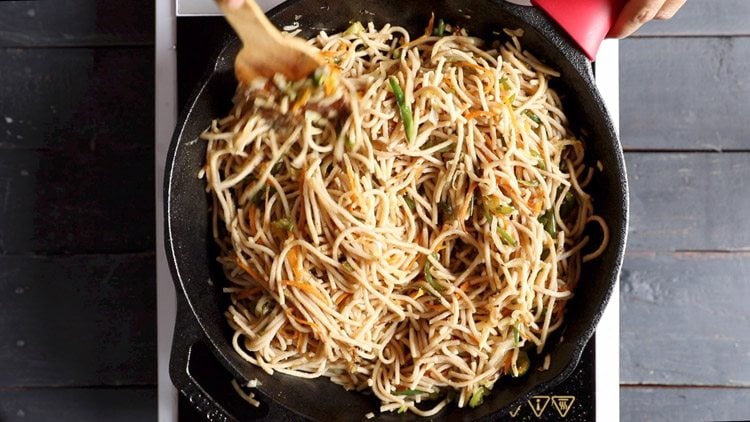

26. Then, add 1 teaspoon rice vinegar or regular white vinegar.
You can even skip vinegar or add mirin or rice wine.
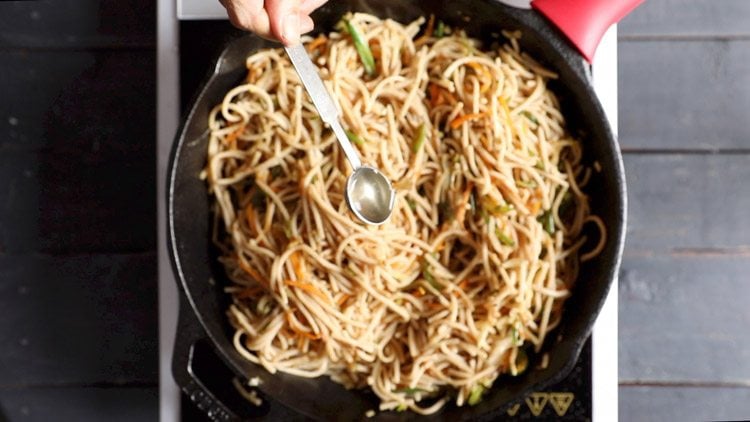

27. Lastly, add 1 to 2 tablespoons chopped spring onion greens. Mix well.
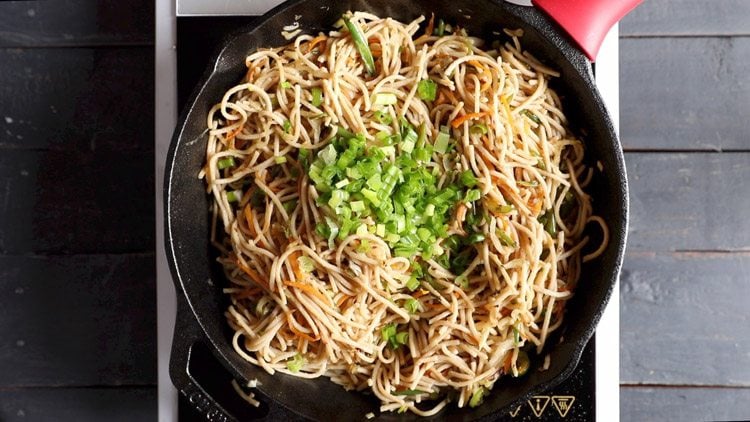

Serving & Storage Suggestions
Serve Veg Noodles steaming hot as it is or with some black bean sauce or schezwan sauce or chilli garlic sauce.
Most of the time we enjoy this Vegetable Noodles as it is. But sometimes I also like to serve it with some spicy, saucy Indian-Chinese style dishes.
So, take your pick and enjoy your noodles with Veg Manchurian, Gobi Manchurian, Chilli Paneer, Paneer Manchurian or any other similar sauce-based dishes.
If there are any leftovers, store it in an air-tight container in the refrigerator for about 1 to 2 days and enjoy as a quick lunch or brunch.
Remember to reheat the noodles in a wok or pan and if they look too dry, sprinkle some water while reheating them.
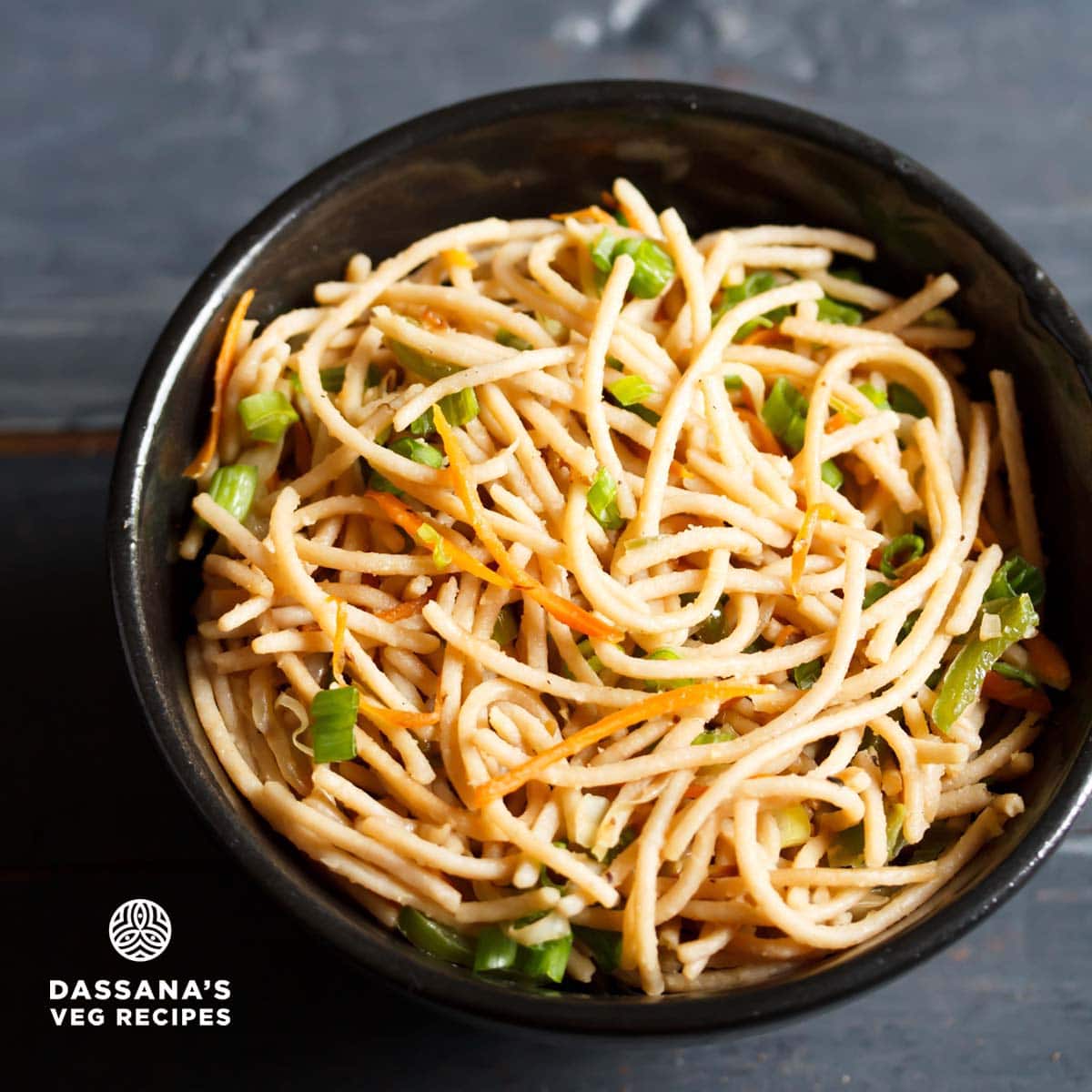

Expert Tips
- Noodles: Use any good quality noodles. You can use whole wheat noodles or plain flour noodles. This recipe can also be made with Hakka noodles, Chowmein noodles, Udon noodles, Soba noodles, ramen noodles or instant noodles.
- Non-sticky noodles: A very important point when making any noodle dish is that it has to be cooked perfectly and should be non-sticky. When the noodles are al dente or just about cooked, strain them in a colander. Then, rinse with fresh water to get rid of the excess starch. Drain off the extra water and toss with 2 to 3 teaspoons of oil.
- Vegetables: You can add your choice of veggies in this dish, and increase or decrease the quantities too, according to your likings. Fresh button or cremini mushrooms also work well in this dish.
- Celery: You can easily skip celery or replace it with coriander leaves (cilantro). Both of them have different flavors. Celery will give a more Chinese flavor and coriander will give an Indian taste.
- Smoky flavor: If possible, use toasted sesame oil to drizzle on the noodles when you serve them. It imparts a good smoky flavor to the dish.
- Stir-frying: Typically, while making any stir-fried dish, the heat has to be high and the ingredients have to be tossed, then stirred continuously. While making such recipes at home, it is better to use a cast iron, carbon steel wok or a pan with handles so it is easy to lift and hold the pan with the handles, while tossing as well as stirring.
- Vinegar: You can prepare this dish without adding vinegar too. Or use either of these in the dish – regular white vinegar, rice vinegar, rice wine or mirin too.
- Gluten free variation: You can use rice noodles or buckwheat flour noodles (soba noodles) to make a gluten free version of this dish.
FAQs
This Vegetable Noodles recipe does not contain MSG (mono sodium glutamate) or Ajinomoto. I have also made it with whole wheat noodles for a healthier option.
For a healthier version, I suggest to use whole wheat noodles or buckwheat noodles (soba noodles). The recipe can be made with regular noodles or even ramen, chow mein, rice or instant noodles.
You can use sunflower oil or any other neutral flavored oil instead of toasted sesame oil.
More Noodle Recipes to Try!
Please be sure to rate the recipe in the recipe card or leave a comment below if you have made it. For more vegetarian inspirations, Sign Up for my emails or follow me on Instagram, Youtube, Facebook, Pinterest or Twitter.
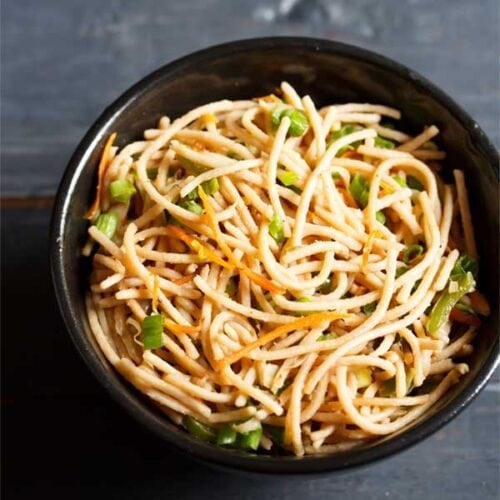

Veg Noodles (Stir Fried Noodles With Vegetables)
Tasty Veg Noodles also referred to as Vegetable Noodles is a Chinese style recipe. The noodles are stir-fried with loads of fresh mix vegetables and seasoned with soy sauce, ginger, garlic and celery. Ready in just 30 minutes, this recipe is vegan, kid-friendly and is fully customizable.
Prep Time 15 minutes
Cook Time 15 minutes
Total Time 30 minutes
Prevent your screen from going dark while making the recipe
Cooking noodles
First boil water in a pan with salt and oil.
Add noodles to the boiling water and cook them till they are just cooked or al dente.
While noodles are cooking, rinse and chop the vegetables.
Once noodles are cooked al dente, drain them in a colander or sieve.
Then rinse noodles in fresh water by placing the colander or sieve under fresh tap water.
Drain all the water and set aside.
Making veg noodles
Heat oil in a wok or pan.
First add the garlic and ginger and stir fry or sauté on low to medium-low heat for some seconds.
Increase the heat to a high and add the chopped spring onions.
Keep on stirring continuously and stir fry the onions till they become translucent.
Add the veggies – carrots, capsicum and french beans.
Continue to toss and stir fry on a high flame till the veggies are almost cooked.
Use a pan with handles as its better to lift it while tossing.
You can also decrease the flame if the heat becomes too much too handle and then stir fry the veggies on a medium flame.
Some crunch should be there in the vegetables, so don’t cook the vegetables till they become completely soft.
Add the soy sauce, celery, salt and pepper. Mix well.
Add cooked noodles. Keep on tossing and stirring till the veggies are mixed well with noodles for a minute or two. Switch off the heat.
Check the taste and add more salt, black pepper or soy sauce if required to the stir-fried veg noodles.
- Stir-frying: Usually, while making any stir-fried dish, the heat has to be high and the ingredients have to be tossed then stirred continuously on the high heat. While making these kind of preparations at home, it is better to use a cast iron or carbon steel wok or a pan with handles so it is easy to lift and hold the pan with the handles, while tossing as well as when stirring.
- Noodles: Use any good quality noodles. You could use whole wheat noodles or plain flour noodles. This veg noodle recipe can also be made with hakka noodles, chowmein noodles, udon noodles or instant noodles. Remember to cook the noodles al dente or according to package instructions.
- Gluten-free variation: Feel free to make this recipe with rice noodles or buckwheat flour noodles (soba noodles).
- Non-sticky noodles: Another very important point when making any noodle dish is that they have to be cooked perfectly and should be non-sticky. When the noodles are al dente or just about cooked, strain them in a colander. This gets rids of any excess starch from them. Then rinse them with fresh water. Drain off the extra water and toss them with 2 to 3 teaspoons of oil.
Nutrition Facts
Veg Noodles (Stir Fried Noodles With Vegetables)
Amount Per Serving
Calories 358 Calories from Fat 99
% Daily Value*
Fat 11g17%
Saturated Fat 2g13%
Sodium 1160mg50%
Potassium 407mg12%
Carbohydrates 58g19%
Fiber 2g8%
Sugar 3g3%
Protein 12g24%
Vitamin A 4170IU83%
Vitamin B1 (Thiamine) 1mg67%
Vitamin B2 (Riboflavin) 1mg59%
Vitamin B3 (Niacin) 4mg20%
Vitamin B6 1mg50%
Vitamin C 25mg30%
Vitamin E 1mg7%
Vitamin K 100µg95%
Calcium 83mg8%
Vitamin B9 (Folate) 77µg19%
Iron 3mg17%
Magnesium 118mg30%
Phosphorus 209mg21%
Zinc 2mg13%
* Percent Daily Values are based on a 2000 calorie diet.
This Vegetable Noodles recipe from the archives was first published in November 2013. It has been updated and republished on November 2024.

Source link